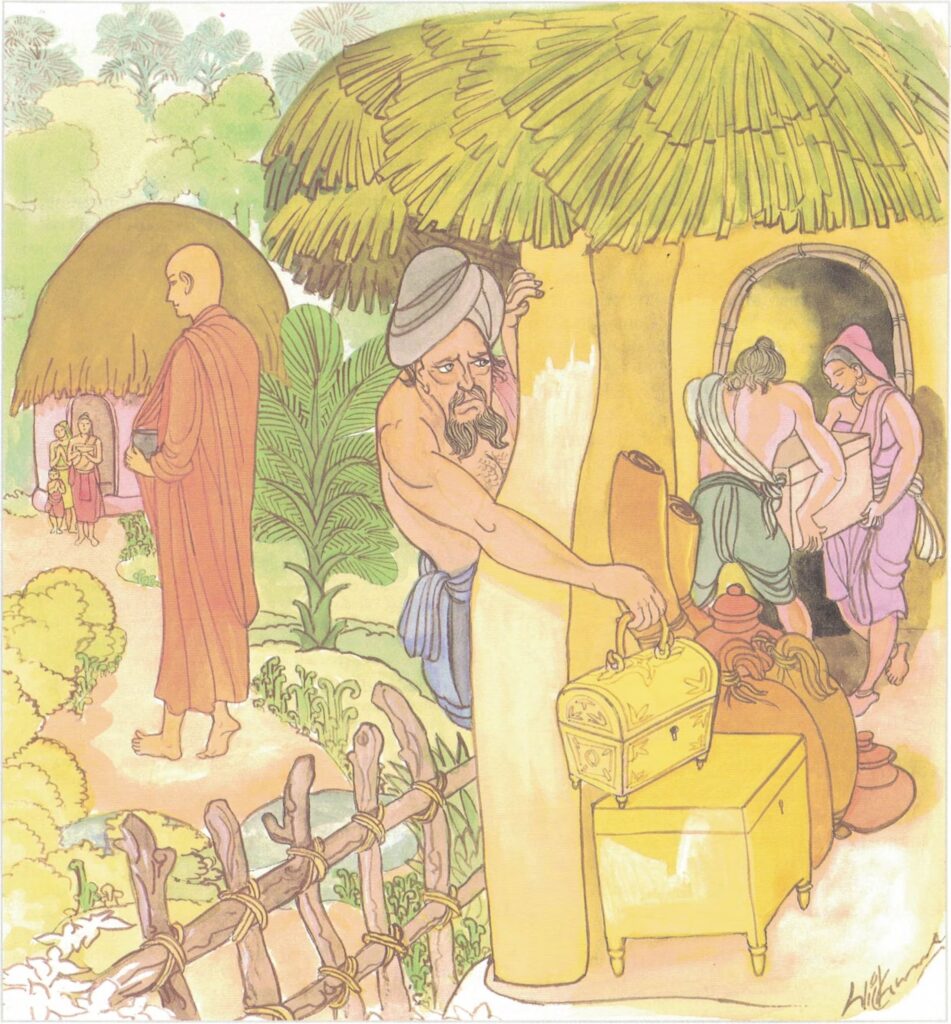Pali text, illustration and English translation of Dhammapada verse 409:
yo’dha dīghaṃ va rassaṃ vā aṇuṃ thūlaṃ subhāsubhaṃ |
loke adinnaṃ nā’diyati tam ahaṃ brūmi brāhmaṇaṃ || 409 ||
409. Who in the world will never take what is not given, long or short, the great or small, the fair or foul, that one I call a Brahmin True.

The Story of the Monk who was accused of Theft
The story goes that a certain brāhman of false views who lived at Sāvatthi, for fear his outer cloth might catch the odour of his body, took it off, laid it aside, and sat down facing his house. Now a certain monk who was an arahat, on his way to the monastery after breakfast, saw that cloth, and looking about and seeing no one, and therefore concluding that it had no owner, adopted it as a refuse-rag, and took it with him. When the brāhman saw him, he went up to him and abused him, saying, “Shaveling, you are taking my cloth.” “Is this your cloth, brāhman?” “Yes, monk.” “I saw no one about, and thinking it was a refuse-rag, took it with me; here it is.” So saying, the Venerable gave the brāhman back his cloth. Then he went to the monastery and related the incident to the monks in detail.
When the monks heard his story, they made fun of him, saying, “Brother, is the cloth you took long or short, coarse or fine?” “Brethren,” replied the monk, “never mind whether the cloth is long or short, coarse or fine; I have no attachment for it. I took it, supposing it to be a refuse-rag.” When the monks heard his reply, they reported the matter to Buddha, saying, “Venerable, this monk says what is not true and utters falsehood.” The Buddha replied, “No, monks, what this monk says is quite true; they that have rid themselves of the evil passions do not take what belongs to other people.”
Explanatory Translation (Verse 409)
idha loke yo dīghaṃ vā rassaṃ vā aṇuṃ thūlaṃ vā subhāsubhaṃ
adinnaṃ na ādiyati taṃ ahaṃ brāhmaṇaṃ brūmi
idha loke: in this world; yo: if some one; dīghaṃ vā: either long; rassaṃ vā: or short; añuṃ: or minute; thūlaṃ vā: or large; subhāsubhaṃ [subhāsubha]: good or bad; adinnaṃ [adinna]: something that was not given; na ādiyati: does not take; taṃ: him; ahaṃ: I; brāhmaṇaṃ brūmi: describe a true brāhmaṇa
In this world if there is some person who does not take anything that is not given, whether long or short, minute or large or good or bad, him I declare a true brāhmaṇa.
Commentary and exegetical material (Verse 409)
brāhmins: The Enlightened One and His disciples had extensive encounters with brāhmins of various types. The story that gives rise to the present stanza is such an encounter. But, there are more profound philosophic encounters between the Buddha and the brāhmins.
Here is one such: Brāhmanic orthodoxy intolerantly insisted on believing and accepting their tradition and authority as the only truth without question. Once a group of learned and well-known brāhmins went to see the Buddha and had a long discussion with him. One of the group, a brāhmin youth of sixteen years of age, named Kāpaṭhika, considered by them all to be an exceptionally brilliant mind, put a question to the Buddha: “Venerable Gotama, there are the ancient holy scriptures of the brāhmins handed down along the line by unbroken oral tradition of texts. With regard to them, brāhmins come to the absolute conclusion: ‘This alone is Truth, and everything else is false’. Now, what does the Buddha say about this?” The Buddha inquired: “Among brāhmins is there any one single brāhmin who claims that he personally knows and sees that ‘This alone is truth, and everything else is false.’?”
The young man was frank, and said, “No.”
“Then, is there any one single teacher, or a teacher of teachers of brāhmins back to the seventh generation, or even any one of those original authors of those scriptures, who claims that he knows and he sees: ‘This alone is truth, and everything else is false’?” “No.”
“Then, it is like a line of blind men, each holding on to the preceding one; the first one does not see, the middle one also does not see, the last one also does not see. Thus, it seems to me that the state of the brāhmins is like that of a line of blind men.”
Then the Buddha gave advice of extreme importance to the group of brāhmins: “It is not proper for a wise man who maintains (lit. protects) truth to come to the conclusion: ‘This alone is truth, and everything else is false.’”
Asked by the young brāhmin to explain the idea of maintaining or protecting truth, the Buddha said: “A man has a faith. If he says ‘This is my faith,’ so far he maintains truth. But by that he cannot proceed to the absolute conclusion: ‘This alone is truth, and everything else is false.’ In other words, a man may believe what he likes, and he may say ‘I believe this’. So far he respects truth. But because of his belief or faith, he should not say that what he believes is alone the truth, and everything else is false.”